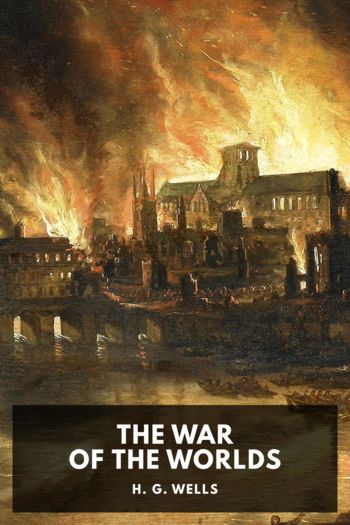The War of the Worlds - H. G. Wells (fun to read .TXT) 📗

- Author: H. G. Wells
Book online «The War of the Worlds - H. G. Wells (fun to read .TXT) 📗». Author H. G. Wells
I touched the curate’s leg, and he started so violently that a mass of plaster went sliding down outside and fell with a loud impact. I gripped his arm, fearing he might cry out, and for a long time we crouched motionless. Then I turned to see how much of our rampart remained. The detachment of the plaster had left a vertical slit open in the debris, and by raising myself cautiously across a beam I was able to see out of this gap into what had been overnight a quiet suburban roadway. Vast, indeed, was the change that we beheld.
The fifth cylinder must have fallen right into the midst of the house we had first visited. The building had vanished, completely smashed, pulverised, and dispersed by the blow. The cylinder lay now far beneath the original foundations—deep in a hole, already vastly larger than the pit I had looked into at Woking. The earth all round it had splashed under that tremendous impact—“splashed” is the only word—and lay in heaped piles that hid the masses of the adjacent houses. It had behaved exactly like mud under the violent blow of a hammer. Our house had collapsed backward; the front portion, even on the ground floor, had been destroyed completely; by a chance the kitchen and scullery had escaped, and stood buried now under soil and ruins, closed in by tons of earth on every side save towards the cylinder. Over that aspect we hung now on the very edge of the great circular pit the Martians were engaged in making. The heavy beating sound was evidently just behind us, and ever and again a bright green vapour drove up like a veil across our peephole.
The cylinder was already opened in the centre of the pit, and on the farther edge of the pit, amid the smashed and gravel-heaped shrubbery, one of the great fighting-machines, deserted by its occupant, stood stiff and tall against the evening sky. At first I scarcely noticed the pit and the cylinder, although it has been convenient to describe them first, on account of the extraordinary glittering mechanism I saw busy in the excavation, and on account of the strange creatures that were crawling slowly and painfully across the heaped mould near it.
The mechanism it certainly was that held my attention first. It was one of those complicated fabrics that have since been called handling-machines, and the study of which has already given such an enormous impetus to terrestrial invention. As it dawned upon me first, it presented a sort of metallic spider with five jointed, agile legs, and with an extraordinary number of jointed levers, bars, and reaching and clutching tentacles about its body. Most of its arms were retracted, but with three long tentacles it was fishing out a number of rods, plates, and bars which lined the covering and apparently strengthened the walls of the cylinder. These, as it extracted them, were lifted out and deposited upon a level surface of earth behind it.
Its motion was so swift, complex, and perfect that at first I did not see it as a machine, in spite of its metallic glitter. The fighting-machines were coordinated and animated to an extraordinary pitch, but nothing to compare with this. People who have never seen these structures, and have only the ill-imagined efforts of artists or the imperfect descriptions of such eyewitnesses as myself to go upon, scarcely realise that living quality.
I recall particularly the illustration of one of the first pamphlets to give a consecutive account of the war. The artist had evidently made a hasty study of one of the fighting-machines, and there his knowledge ended. He presented them as tilted, stiff tripods, without either flexibility or subtlety, and with an altogether misleading monotony of effect. The pamphlet containing these renderings had a considerable vogue, and I mention them here simply to warn the reader against the impression they may have created. They were no more like the Martians I saw in action than a Dutch doll is like a human being. To my mind, the pamphlet would have been much better without them.
At first, I say, the handling-machine did not impress me as a machine, but as a crablike creature with a glittering integument, the controlling Martian whose delicate tentacles actuated its movements seeming to be simply the equivalent of the crab’s cerebral portion. But then I perceived the resemblance of its grey-brown, shiny, leathery integument to that of the other sprawling bodies beyond, and the true nature of this dexterous workman dawned upon me. With that realisation my interest shifted to those other creatures, the real Martians. Already I had had a transient impression of these, and the first nausea no longer obscured my observation. Moreover, I was concealed and motionless, and under no urgency of action.
They were, I now saw, the most unearthly creatures it is possible to conceive. They were huge round bodies—or, rather, heads—about four feet in diameter, each body having in front of it a face. This face had no nostrils—indeed, the Martians do not seem to have had any sense of smell, but it had a pair of very large dark-coloured eyes, and just beneath this a kind of fleshy beak. In the back of this head or body—I scarcely know how to speak of it—was the single tight tympanic surface, since known to be anatomically an ear, though it must have been almost useless in our dense air. In a group round the mouth were sixteen slender, almost whiplike tentacles, arranged in two bunches of eight each. These bunches have since been named rather aptly, by that distinguished anatomist, Professor Howes, the hands. Even as I saw





Comments (0)